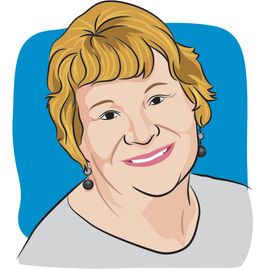- About Us
- Advertise / Support
- Editorial Board
- Contact Us
- CancerNetwork.com
- TargetedOnc.com
- OncLive.com
- OncNursingNews.com
- Terms & Conditions
- Privacy
- Do Not Sell My Information
- Washington My Health My Data
© 2025 MJH Life Sciences™ and CURE - Oncology & Cancer News for Patients & Caregivers. All rights reserved.
Things You Should Not Say to a Cancer Survivor

Jane Biehl is a 12-year survivor of a very rare form of blood cancer, known as myelodysplastic syndrome (MDS). She has enjoyed several exciting careers including a librarian, counselor, teacher, and writer. She loves to write about surviving cancer, overcoming hearing loss and the wonderful benefits of having a hearing-ear service dog.
A cancer survivor discusses the hurtful words people say to cancer survivors and why they sting.
I want to begin by saying I honestly do not think any of our friends or family say things to deliberately upset us. I also admit some of us are sensitive because of all we have been through battling an insidious and awful disease and may overreact — I know I do. I have blurted out hurtful words without thinking and want to take them back as soon as they shoot out of my mouth. I just want to educate people on how to be more aware of what they are saying.
Here is a list of remarks that can be disrespectful.
1. “You are lucky you lived this long.”
I was with my dental hygienist and we were going over my medical history. I was not even whining, just stating what was happening. She made the offhand remark that I had already lived longer than I was supposed to. I gaped at her — did that mean I did not want more precious years?
2. “You look great, not sick.”
I know this is intended to be a compliment, but it sort of puts me in the category of being a fraud. I deliberately pay to get my hair and nails done so I look my best.
People also say to me that I am the only person they ever knew who did not lose her hair to chemo. The newer chemotherapies for some diseases are not as harsh, and some of us do get to keep our hair. When I was going on new chemo I asked my doctor if I would lose my hair, which seems to be one of the first questions women ask. However, one of the cancer survivors on the patient advisory council I am on was bald and never wore a headscarf or wig. And she was truly beautiful!
3. “I get tired, too.”
This is minimizing the horrible fatigue that most of us feel from cancer and its side effects. I am not talking about the tiredness that makes me want to go to bed. I am talking about literally pulling myself up a staircase and stopping halfway up because of aching muscles and no energy.
4. “You would not have survived this years ago and should be grateful.”
Sometimes I mention to people after 11 years of doctors, blood draws, side effects from chemo and the fear of going on a new protocol that I am tired. They then tell me that I am lucky to be living this long and that 40 years ago I would be dead.
Yes, I know that and am grateful, but please allow me to be tired of the whole regime. Going every single week for treatments at the hospital, even during holidays, is a burden — believe me!
5. “This COVID-19 variant is not as dangerous as the others, so why can’t you fly?”
Yes, often the news states that it is safe for most people to fly. What people miss is the second part about how it is dangerous for people with underlying conditions, and for many of us who have two or three or more underlying problems.
We hate not seeing our families out of state, but we have to use caution other people do not.
These are just a few seemingly innocuous statements made to us. But they still hurt. Please just realize that most of us are trying to get through the day. We are fatigued, we constantly go for treatments and we are always fearful of cancer getting worse or another infection like COVID-19 killing us.
We are also grieving the days when we could proceed our lives as “normal.” Normal doesn’t happen anymore and the “new normal” isn’t always what we want. I do think with the pandemic all of us are grieving and thinking about when life was easier.
You may ask what DO I want people to say? It is not so hard. You can say you are sorry we are so fatigued and going through all of this. You can also ask how you can help. I have one friend who brings me soup every week when I get my treatments and I cherish her so much. Often we just want someone to listen and let us vent. So listen to us and just let us know you are there — we appreciate you more than you know!
For more news on cancer updates, research and education, don’t forget to subscribe to CURE®’s newsletters here.
Related Content:



